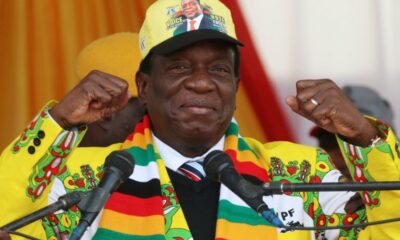
Politics
Zimbabwe On The Edge: Who Will Rule The Country Next?

As the world turned its attention to Zimbabwe, a nation with a history of tumultuous elections, the anxiety was palpable among its citizens.
iexclusivenews reports that the anticipation was especially intense as armed police, equipped with water cannons, stood sentinel outside the national results center.

A location marred by deadly violence following the previous Zimbabwe elections five years ago.
A Clouded Process: Observers Raise Concerns
This week’s electoral proceedings faced sharp scrutiny from African election observer missions.
Allegations surfaced of voter intimidation by a group allegedly affiliated with the ruling ZANU-PF party, casting shadows over the election’s integrity.

Adding to the unease, Zimbabwean authorities dragged dozens of local election monitors to court on charges of subversion, igniting claims of fabricated accusations by government critics.
Preliminary Trends: A Tale of Contrasting Landscapes
Initial reports from the Zimbabwe Electoral Commission hinted at a familiar pattern – ZANU-PF securing its grip on traditional rural strongholds.
While the Citizens Coalition for Change gained ground in the urban areas that have historically aligned with the opposition.
The true climax, however, lay in the suspenseful wait for the results of the presidential race, a revelation that was predicted to unfold over the span of several days.
A Wary Population: Skepticism in the Air
The nation’s turbulent history of contested elections had left its mark on the collective psyche.
Zimbabweans, with a sense of caution forged through experience, approached official results with a blend of hope and skepticism, a sentiment deeply rooted in their past.
Election Day Saga: A Journey of Endurance
As voting came to a close, tales of perseverance emerged from urban areas, particularly Harare.
Delays in distributing ballot papers prompted President Emmerson Mnangagwa to extend the voting timeline.
Undeterred, many voters from opposition strongholds chose to spend the night outside polling stations, their determination echoing the resonance of their ballots.
A Battle of Titans: Mnangagwa vs. Chamisa
At the heart of the electoral showdown stood President Emmerson Mnangagwa, vying for a second and final five-year term.

Zimbabwe’s president, Emmerson Mnangagwa, lifts his hat to the crowd at his final reelection campaign rally on Saturday, ahead of general elections on Wednesday. Mnangagwa is confident of victory, but critics have said rising voter intimidation and bias of state institutions in favor of the ruling party risk the credibility of the election. / Tendai Marima for NPR
His challenger, Nelson Chamisa, a 45-year-old lawyer and pastor, posed a significant threat.
Their rivalry was a continuation of the closely contested 2018 election, where Mnangagwa narrowly secured victory.
A Post-Mugabe Landscape: Winds of Change

Supporters of Zimbabwe’s main opposition, the Citizens Coalition for Change (CCC), raise their fingers to symbolize change at a rally addressed by presidential candidate Nelson Chamisa at White City Stadium on Sunday in Bulawayo, Zimbabwe, ahead of general elections on Wednesday. / Tendai Marima for NPR
This election marked the second since the removal of the long-reigning authoritarian leader, Robert Mugabe, in 2017.
The nation’s democratic journey encompassed the selection of the president, a 350-member parliament, and nearly 2,000 council seats across the country.
With over 6 million registered voters, the election’s turnout remained a mystery, awaiting revelation.
International Observations: Alarms of Intimidation
International observers, including missions from the African Union, Southern African Development Community (SADC), and African Union Observer Missions, echoed concerns of voter intimidation.
A ruling party affiliate named Forever Associates of Zimbabwe came under scrutiny for allegedly collecting information from voters, casting doubts on the sanctity of the process.
Credibility in Question: Divergent Views
While the electoral body had assured the SADC mission of the availability of all voting materials, including ballot boxes, the shortage of such materials on voting day prompted the mission to question the credibility of the process.
The European Union observer mission and the Carter Center further fueled skepticism, with the latter emphasizing the constrained political atmosphere.
Controversy Unveiled: Legal Battles and Allegations
Controversy took a legal turn as police arrested 41 workers associated with accredited poll monitoring groups.
Accused of “subversive and criminal activities,” these arrests painted a picture of opposition-led efforts to manipulate the results.
In response, the Zimbabwe Lawyers for Human Rights defended the arrested individuals, emphasizing their roles as election observers.
A Nation’s Struggle: Elections Amidst Turmoil
The backdrop against which these elections unfolded was one of turmoil. Allegations of violence and intimidation intertwined with grievances from the opposition and human rights advocates, pointing fingers at President Mnangagwa for using law enforcement and the judicial system to suppress dissent.
Amidst these tensions, the nation grappled with a currency crisis, escalating food prices, a fragile healthcare system, and a scarcity of formal employment opportunities.
Echoes of Victory: Dueling Claims
As the nation held its breath, both the ZANU-PF party and the Citizens Coalition for Change confidently proclaimed their paths to victory.
Nelson Chamisa, in a show of optimism, declared a “decisive win” on social media. The state-run Herald newspaper echoed these sentiments, reporting ZANU-PF’s early lead based on preliminary parliamentary results.
Awaiting the Verdict: Patience as a Virtue
In the midst of swirling speculations and swirling tensions, the elections body urged patience from the populace.
The journey from anxiety to clarity remained a process, one that the nation hoped would ultimately yield an outcome that reflected the collective will of the people.
An Unfolding Democracy
As the suspense persisted, Zimbabwe stood on the cusp of a crucial juncture in its democratic journey. The echoes of its history reverberated in the cautious optimism and skepticism of its citizens.
With each passing moment, the Zimbabwe nation inched closer to unraveling the mystery that would shape its political landscape for years to come.
AP and iexclusivenews























